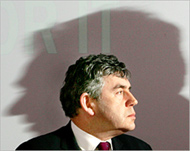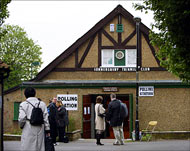British voters go to polls
British voters have gone to the polls, with surveys suggesting Prime Minister Tony Blair will win a third consecutive term despite anger over his decision to go to war in Iraq.

Blair is less popular than he was when he swept to power in landslide victories in 1997 and 2001.
His decision to back US President George Bush in launching a war in Iraq has hurt his public trust ratings and infuriated many traditional supporters of his centre-left Labour Party.
Economy strengthening
But he has campaigned on the strength of the economy, which has blossomed throughout his eight years in office.
He says a third term would be his last and has campaigned alongside his heir apparent, Chancellor of the Exchequer Gordon Brown, principal architect of his economic policies.
 |
|
Brown is likely to keep his |
Blair’s main opponent, the centre-right Conservatives, have had trouble capitalising on the issue of Iraq, since they backed the war. But they have used the case Blair made for the conflict to hammer at his personal credibility while campaigning on calls for tighter controls on immigration.
Polls show the anti-war third party, the Liberal Democrats, getting a lift because of the Iraq issue. The Conservatives could also benefit if Labour supporters angry over the war stay home.
Winning a third straight mandate would be a first for a Labour leader – only Conservative Margaret Thatcher has done it before.
Majority reduced
But if his parliamentary majority is much reduced from the massive 161-seat advantage he has enjoyed in the 646-seat house, he could have difficulty pushing through his plans, especially health and education reforms opposed by some in his party.
A final Populus poll for The Times newspaper gave Labour 37.9% of the votes, with the Conservatives lagging with 31.7%.
It said that would translate into a parliamentary majority for Blair of 100 to 130 seats.
Close call
But such predictions are tricky. Under Britain‘s electoral system – unlike the proportional party representation in most European countries – everything hangs on the outcome of races in individual districts, many of which are too close to call.
 |
|
Voters have from 7am to 10pm |
Polls opened at 7am (0600 GMT) and will close at 10pm on Thursday. The first indication of the result will come almost instantly from an exit poll of thousands of Britons who have cast their vote, by broadcasters BBC and ITV.
In the past two elections, exit polls accurately predicted Blair victories. But in both those cases he won by wide margins.
In the narrower 1992 election, the polls wrongly forecast a Labour victory when Conservative John Major won.
Voter concerns
In the tightest race in London, a slow but steady stream of well-heeled residents stopped to cast their ballots at a polling station.
“I was quite impressed with Tony Blair and new Labour when they came in. They seemed so fresh,” said William Begley, a 33-year-old lawyer.
But now Begley finds Blair “deceptive on things like taxes”, and is casting his ballot for a local Conservative candidate.
Other voters had different criteria when casting their ballots.
“Our criterion is whether the candidate serves the Islamic issues or not,” deputy head of the Islamic League in London Muhammad Sawalha told Aljazeera.
|
“Our criterion is whether the candidate serves the Islamic issues or not,” Muhammad Sawalha, deputy head, Islamic League in London |
“We hope women’s participation in the election will be big and active … because there have been problems concerning women, like the freedom to wear the hijab (headscarf),” said Asma Rizqi of the Islamic Care House.
“It (hijab) is a significant issue compared to European countries like France. This move allows women to actively participate in the political life in Britain,” she added.
Low turnout
Surveys show Labour supporters are less likely to vote than their opponents, so low turnout could hurt Blair.
When Blair stormed to power in 1997, national turnout was 71%, but that slumped to 59% in 2001 – the lowest level since the first world war.
After an exhaustive bout of cross-country campaigning, Blair will cast his own vote in his home seat of Sedgefield, northern England, early on Thursday and await a night-time declaration of his personal result before returning to London.
“It is going to be decided in these marginal constituencies, and a few hundred votes or a few thousand votes either way will determine the result,” he said in a last bout of electioneering late on Wednesday.
If Blair is re-elected, his first task on Friday, his 52nd birthday, would be to shape a new cabinet. He has already made clear Brown will remain in his post at the treasury.